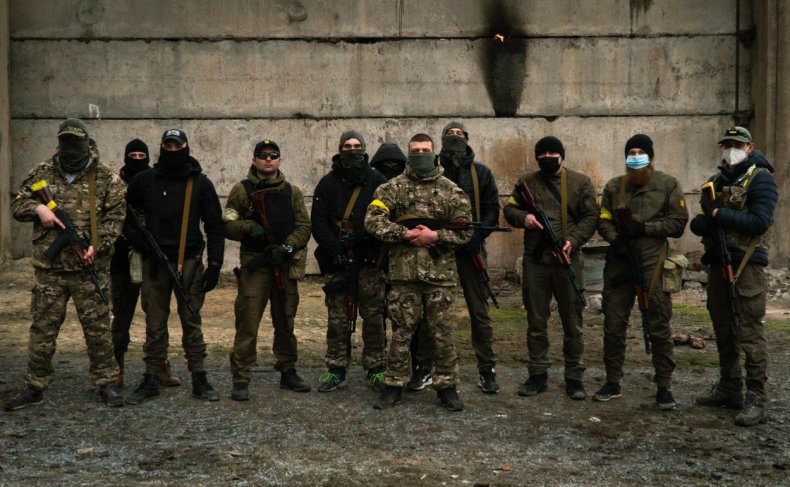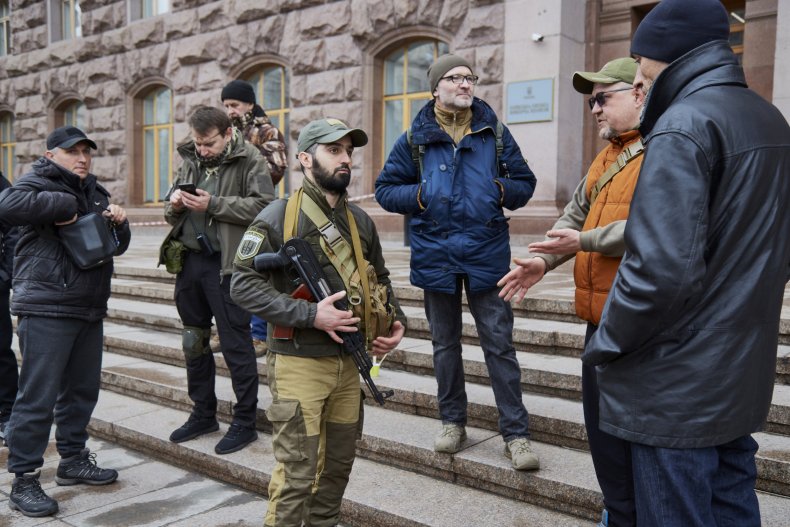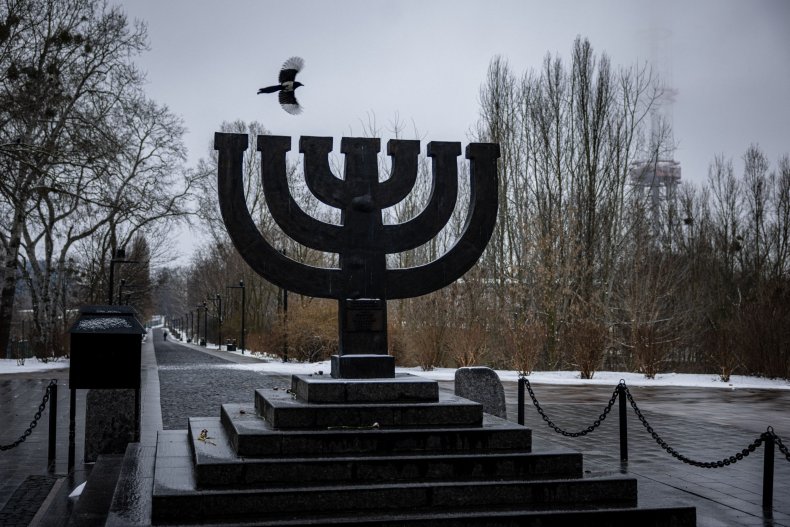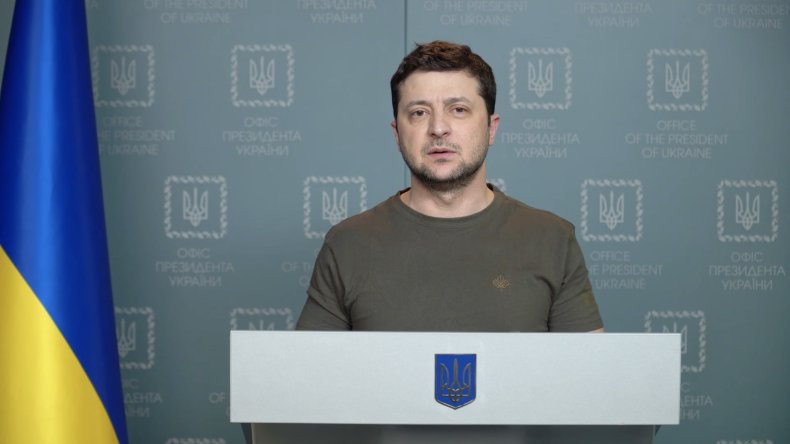As Ukraine Rallies Nation to Defend from Russia, Far-Right Joins the Fight
Experts with whom Newsweek spoke scrutinized Putin's stated goal to "denazify" Ukraine through the "special military operation" ordered last week amid months of Russian military buildup along the neighboring country's borders. But these experts have also long raised the alarm about a growing far-right and even neo-Nazi community operating in paramilitary groups and within the Ukrainian Armed Forces themselves.
Investigative journalist Oleksiy Kuzmenko has specialized in studying the phenomena of the far-right among Ukraine's military and paramilitary groups. He told Newsweek that the country's resistance against Russia appears to be "a whole of society effort," and argued that "Putin's claimed 'Denazification' pretext for the invasion and current spins from Moscow that its forces are only fighting 'nationalist battalions' as opposed to regular military are propagandist."
"That being said," Kuzmenko added, "the internationally active far-right Azov movement, via its political wing the National Corps party, appears to be involved in the fight against Russia in a number of Ukrainian cities, including Kyiv and Kharkiv, as part of the territorial defense forces."
The involvement of the Azov movement appears to be evolving.
"In fact, the National Corps now talks about a dedicated 'Azov territorial defense detachment' in Kyiv," Kuzmenko said. "At the same time, the National Guard of Ukraine's Azov Regiment, which is also the military wing of the Azov movement, plays an important role in the defense of the city of Mariupol."
And as the Ukrainian government opens its armories to promote civilian self-defense and tasks embassies around the world with accepting international fighters, Kuzmenko pointed out that the Azov movement has called on "foreign volunteers" to join.
But this invitation comes as Kuzmenko notes "there are clear indications that the Azov movement isn't fully aligned with the government of Ukraine." In recent messages, the movement's leader, Andriy Biletsky, has openly criticized Ukrainian President Volodymyr Zelensky for entering into negotiations with Russia days into the incursion now threatening to encircle Kyiv and other major cities.
This backlash comes despite the fact that the Azov Regiment has been armed and trained by the government as part of the National Guard.
While Kuzmenko emphasizes that "there are no indications that the Azov Regiment is disobeying orders," he also noted that the movement's messaging "suggests that — as it has been the case since its inception — the internationally active far-right Azov movement will continue to pursue its own agenda in the time of war even when it's not aligned with the government."
Kuzmenko also notes that, as part of the Ukrainian National Guard, the Azov Regiment has had access to Western military support, creating a complex situation made all the more polarizing by the fact that Ukraine is in the midst of a war.
"Some can speculate that the far right's access to Western military training provided to the military and security forces of Ukraine added to Russia's sense that the West is building Ukraine into an anti-Russia," Kuzmenko said. "Others will point out that for Ukraine every fighters counts."
"Clearly right now, it's the Russian invasion that threatens Ukraine's very survival," he added. "That being said, based on their ideology, Ukrainian far-right pursue their own vision of Ukraine. It is not necessarily the Ukraine President Zelensky envisions, but they're clearly fighting the same fight now."

Among those who have raised the alarm about the Ukrainian far-right's access to Western support is Jonathan Brunson, who served as a political analyst at the U.S. Embassy in Kyiv and senior Ukraine analyst for Crisis Group. He also warned against potentially undermining the Ukrainian military's efforts by overstating its more radical elements.
Brunson, now a political warfare analyst at the Exovera Center for Intelligence Research and Analysis, told Newsweek that "today is not the time to criticize Ukraine's military."
"The far right doesn't monopolize it either," he argued, "and should be separated from considerations of the Armed Forces."
At the same time, he noted that "aiding or overlooking the far right likely made Ukraine more vulnerable," and "any extra military strength added to resistance potential now also plays into the same toxic Russian propaganda that Putin uses to rationalize re-invasion."
At a time when Ukraine is desperate for soldiers to counter the Russian invasion, the emphasis needs to be on numbers, not on ideology, Brunson said.
"Before re-invasion, aid to the far right was plausibly accidental. But that may no longer be the case, because 'all hands on deck' means just that — and enables Ukraine's far right to play a heroic role they otherwise wouldn't," he said.
"The far-right is also vocal in its intent to fight even harder than other Ukrainians," Brunson added, "as Putin's goal specifically threatens 'denazification' that would 'bring them to justice."
Like Kuzmenko, Brunson emphasized that Putin's pretext for intervention is cynical, and Ukraine has little choice but to accept any and all help from wherever it can be found, "despite the risk of far-right groups perhaps discrediting the resistance."
But, having observed the Ukraine situation from positions within the U.S. government and international organizations, Brunson thinks Washington and its allies could have done more before the war to neutralize the rise of Ukraine's banderivtsy.
It is a term disdained by Russia that Putin uses to justify intervention. But it is revered by some Ukrainians in reference to the acolytes of ultranationalist Stepan Bandera, who sought Nazi German support to gain Ukrainian independence from the Soviet Union during World War II.
"Western allies could have isolated the far-right, but blew it by delegitimizing all this as conspiracy theories and propaganda, even after decades of documented covert and overt support," Brunson said. "It's not just war over Ukraine, but war over history and retellings of World War II. However, any legitimacy Putin's history may have once had evaporated when he announced 'denazification' of an otherwise vibrant and diverse liberal democracy."
"Yet we still call history war propaganda, even after Putin claims to start a real war over it," he added. "Only if war degenerates into full Ukrainian collapse would we see the far-right monopolize resistance or execute pro-Russian collaborators in the streets. Until then, Ukraine's far-right is just another element of a desperate national defense."
While Russian troops and separatist allies take on Ukraine's security forces as a whole, Moscow's public messaging has focused on nationalist units.
"You know that there is a huge number of nationalist military formations operating there, Bandera adherents, nationalists, battalions and so on," Kremlin spokesperson Dmitry Peskov told reporters Wednesday, according to the state-run Tass Russian News Agency. "Surely, it is necessary to get rid of them."
Many of the forces in Ukraine accused of being linked to neo-Nazism have outright rejected the label but have embraced a nationalist ideology. Among the largest and most active contingent often branded as being associated with fascism is Pravyi Sektor, or Right Sector, whose leader, Andrii Tarasenko, told Newsweek he preferred the alternative.
"For propaganda purposes, it is alleged that there are some Nazis, fascists in Ukraine, although we, Ukrainians, are nationalists," Tarasenko said.
The political party and paramilitary group was formed in 2013 during the Euromaidan protests that ultimately ousted a Ukrainian government friendly with Moscow and brought to power a new one seeking closer ties with the West.
The uprising was followed by Russia's annexation of Crimea after an internationally disputed referendum and the outbreak in the eastern Donbas region of a pro-Moscow insurgency against which Right Sector has clashed for eight years.
"We unequivocally stand against all the fascist or Nazi things that Putin attributes to us," Tarasenko said. "This is purely Russian propaganda, and we have nothing to do with such ideological positions.
"Our ideology is the ideology of statehood of our nation on our land," he said, "and it is what we are now fighting for with arms in our hands, and we will definitely win!"
Tarasenko said the Right Sector "is fighting Moscow's occupiers throughout Ukraine" in a very different war that the one that erupted in 2014.
"Unlike the 2014 invasion of eastern Ukraine and Crimea by Moscow's occupying forces, this time we witness a full-scale invasion in multiple directions, i.e. East, North, and South," Tarasenko said.
"This full-scale invasion by Moscow's occupation troops entailed mass self-mobilization of the population, including members of the Right Sector," he added. "With the onset of this aggression, more of our people came to fight. They are involved in the defense of the Donbas and Kyiv, as well as in all the other hot spots along the frontline in Ukraine."
Tarasenko said that his group had its own training, weapons and ammunition stemming from the Donbas conflict, but also confirmed that "the state provides arms as part of the resistance to aggression."
He said his group is willing to accept aid from wherever it comes.
"We believe that the entire civilized world should support our state, and we, the Right Sector, as a structure, which is coordinating its efforts in the matter of defense of our lands, with the state power structures, are willing to use all resources that will become available for the purposes of our security," Tarasenko said.

And though he described his group as a "nationalist formation," other groups have fully and openly embraced Nazi symbolism, such as Wotanjugend, established in 2016 by Russian national Aleksei Levkin.
While Putin has exploited nationalism in his own country to cement his rule at home, a community of further-right elements exists that oppose the Kremlin, and Levkin himself was pictured just days ago holding what appeared to be a U.S.-made Javelin anti-tank missile launcher as part of Ukraine's resistance.
The photo, shared on Telegram, was one of many showing Azov movement-linked fighters holding such weapons produced by the United States.
Newsweek asked Pentagon spokesperson Marine Corps Lieutenant Colonel Anton T. Semelroth in January about the U.S. military's efforts to prevent far-right elements within the Ukrainian Armed Forces from receiving U.S. weapons and training as tensions mounted between Kyiv and Moscow.
"We engage the Ukrainian government through our relationship with its Ministry of Defense to emphasize the importance of ensuring professionalism, a unified chain of command, and the integration of former volunteer battalions under Ukraine's armed forces," Semelroth said.
"Furthermore, like with all of our partnerships, we closely monitor incidents of violence committed by radical groups," he added. "These are all part of reforms we continue to support through our military-to-military relationships as Ukraine works towards achieving its Euro-Atlantic aspirations."
Newsweek has previously reported on the movement of members of far-right militias, including those from the U.S., to Ukraine. Hans-Jakob Schindler, senior director of the Counter Extremist Project, said public calls for action may only exacerbate the trend.
"Immediately after the invasion, some groups within Ukraine affiliated with right-wing extremism, in particular the Azov Regiment, which is now part of the Ukrainian Interior Ministry, have put out public calls on social media for volunteers to come and join them," Schindler told Newsweek. "The Azov Regiment issued fairly detailed travel instructions via its social media channels but made clear that a) travel will not be facilitated until the individual is in Ukraine and b) no payment will be given for the volunteers and c) several months of service should be expected."
He noted that this was a reversal of the previous stance forbidding international recruits as part of a bid to become integrated into the Interior Ministry.
A lack of data amid the fog of war has prevented efforts to track whether or not a significant number of fighters have answered the call. But, as Schindler notes, decisions made by Western governments to allow their nationals to fight in Ukraine may encourage some to join the battle.
"These public stances of European governments, such as the U.K. or Germany, although not meant to encourage right-wing extremists to travel, may however indirectly be seen as a 'green light' also for right-wing extremist individuals to do so," Schindler said. "It has to be taken into consideration that especially Germany is geographically very close to Ukraine (the distance between Berlin and the Ukrainian border is closer than the distance between Hamburg and Munich in Germany)."
And while some U.S.-based neo-Nazi groups such as The Base or the Atomwaffen Division have been known to back Ukraine against Russia, other right-wing sectors, including white nationalists and some ultra-conservative evangelicals have applauded Putin's war.
Even former President Donald Trump has oscillated between calling Putin's decision to intervene "genius" and more recently on Wednesday describing the conflict as "a holocaust."
Schindler said debate over which side to support has also played out in European far-right discourse, one that he said appears more recently to have weighed overwhelming in favor of Ukraine. He pointed out that one motivating factor for this shift "was the news that Russia would deploy Chechen Muslim fighters, which allowed the debate among right-wing extremists to be framed as a fight of 'white Ukraine' against 'Muslim Russia.'"
And Schindler, who previously served on the United Nations Security Council's team for tracking Islamist militants like the Islamic State (ISIS), Al-Qaeda and the Taliban, said, unlike the jihadis that flocked to conflicts in countries like Afghanistan, Iraq and Syria, foreign far-right fighters did not appear to add "an external addition of violence or radicalization into the conflict."
But they still posed a major domestic terrorism threat, one potentially heightened by the fact that, since the ranks they were joining were not considered international terrorist organizations, they would not be subject to the same monitoring as jihadi recruits.
"The risk about right-wing extremist foreign fighters that joined the conflict in Ukraine in 2014 and those that may join the conflict now lies in the fact that these violence-oriented individuals receive military training under combat conditions and subsequently return to their home countries," Schindler said. "They now present a cohort of right-wing extremist individuals in Europe and the U.S. that are particularly dangerous if they chose to act at home."
He also noted instances of pro-Russian groups also seeking to tap into right-wing extremist communities for support on their side of the war.

The relationship between nationalism and Nazism in Russia and Ukraine has deep and complex roots that have often exacerbated the rift between Kyiv and Moscow, even prior to the 2014 uprising that sought to bring Ukraine into the Western fold.
Under former Ukrainian President Viktor Yushchenko, who led the country from 2007 to 2010, Kyiv initiated the official heroization of Bandera and his Organization of Ukrainian Nationalists, a move met with deep criticism from Moscow, as well as other countries involved in World War II and international Jewish organizations. That move had reverberations that are still felt today in the region.
"Although his successor as president, Viktor Yanukovych, rejected these memory politics," John-Paul Himka, professor emeritus at the University of Alberta, told Newsweek, "the glorification of the Nationalists returned with a vengeance after the Euromaidan and first Russian invasion."
And while Himka said that the "current president, Volodymyr Zelensky, has not promoted the cult," the author and historian argued that "it remains influential at the state level."
Now, Putin's attack has fueled far-right rhetoric, he explained.
"Russia's new invasion of Ukraine has only increased the Nationalists' popularity," Himka said.
The large-scale incursion has also further inflamed an already controversial debate over Ukraine's historic relationship with Nazism, as evidenced by Putin's lengthy, somewhat emotional speech in which he sought to justify forcefully tearing Ukraine away from nationalist and NATO aspirations.
"Putin has referred to their collaboration with Nazi Germany during World War II in his propaganda," Himka said, "The dominant narrative among Ukrainians in the diaspora and in the western part of Ukraine is that the Nationalists fought both the Nazis and the Soviets."
"Holocaust historians in the West and in Ukraine itself have been developing a critique of the latter narrative," he added, "pointing to the Nationalists' participation in the murder of Jews and other ethnic groups, particularly Poles."
Today, however, NATO member Poland is one of Ukraine's staunchest supporters in the conflict with Russia. Current political sentiment in Warsaw shares many of Kyiv's bitter memories under both Nazi and Soviet rule, and the current rise of right-wing politics in Poland has also served as a vector against Russia.
Himka pointed out that Ukraine is far from the only nation in the West to see "the rise of neofascism in recent years," but he identified two factors he argued were unique to the country.
"One is that Ukrainian neofascists have had eight years of combat experience thanks to the first Russian invasion of 2014," Himka said, "Secondly, the glorification of the Nationalists has attracted youth into torchlight parades and paramilitary organizations."
However, he emphasized that "like elsewhere, in Ukraine neofascism remains a minority movement," and "its influence is greatly exaggerated in Putin's propaganda."
After Zelensky's election in 2019, the country became the only other nation in the world to have both a Jewish president and prime minister, and Himka argued Zelensky's rise was based on merit, not heritage.
"Antisemitism still exists in Ukraine, as elsewhere, but sociological studies have shown that most Ukrainians think of Russians and Jews who live in Ukraine to be no different than anyone else," Himka said.
"President Zelensky was elected not because he was of Jewish heritage or a Russophone," he added, "but because he ran on an anti-corruption platform."

https://www.newsweek.com/ukraine-rallies-nation-defend-russia-far-right-joins-fight-1684187

Geen opmerkingen:
Een reactie posten
Opmerking: Alleen leden van deze blog kunnen een reactie posten.